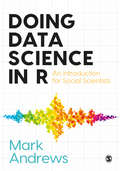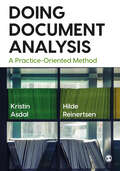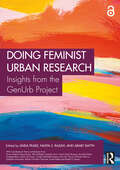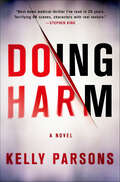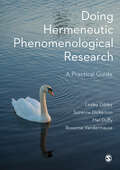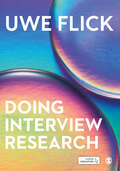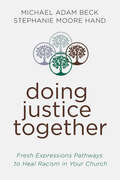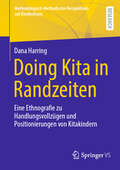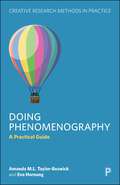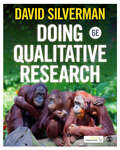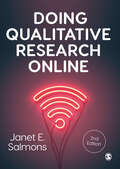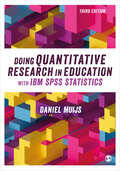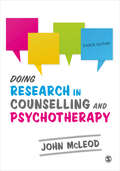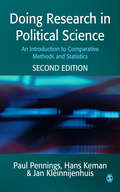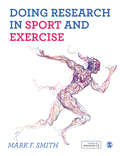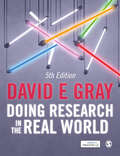- Table View
- List View
Doing Data Science in R: An Introduction for Social Scientists
by Mark AndrewsThis approachable introduction to doing data science in R provides step-by-step advice on using the tools and statistical methods to carry out data analysis. Introducing the fundamentals of data science and R before moving into more advanced topics like Multilevel Models and Probabilistic Modelling with Stan, it builds knowledge and skills gradually. This book: Focuses on providing practical guidance for all aspects, helping readers get to grips with the tools, software, and statistical methods needed to provide the right type and level of analysis their data requires Explores the foundations of data science and breaks down the processes involved, focusing on the link between data science and practical social science skills Introduces R at the outset and includes extensive worked examples and R code every step of the way, ensuring students see the value of R and its connection to methods while providing hands-on practice in the software Provides examples and datasets from different disciplines and locations demonstrate the widespread relevance, possible applications, and impact of data science across the social sciences.
Doing Data Science in R: An Introduction for Social Scientists
by Mark AndrewsThis approachable introduction to doing data science in R provides step-by-step advice on using the tools and statistical methods to carry out data analysis. Introducing the fundamentals of data science and R before moving into more advanced topics like Multilevel Models and Probabilistic Modelling with Stan, it builds knowledge and skills gradually. This book: Focuses on providing practical guidance for all aspects, helping readers get to grips with the tools, software, and statistical methods needed to provide the right type and level of analysis their data requires Explores the foundations of data science and breaks down the processes involved, focusing on the link between data science and practical social science skills Introduces R at the outset and includes extensive worked examples and R code every step of the way, ensuring students see the value of R and its connection to methods while providing hands-on practice in the software Provides examples and datasets from different disciplines and locations demonstrate the widespread relevance, possible applications, and impact of data science across the social sciences.
Doing Document Analysis: A Practice-Oriented Method
by Kristin Asdal Hilde ReinertsenUniting methods from disciplines across the social sciences and humanities, this hands-on guide develops a novel approach to doing document analysis. The authors present a framework for studying documents that enables you to conduct a rich and systematic analysis of documents in all their diversity. Focussing on document analysis both in practice and as practice, the book provides you with an innovative and versatile toolkit for analysing print and digital documents. It also: Highlights the impacts of digitalisation on documents themselves and the methods used to study them Has a strong focus on research ethics and critical engagement with digital sources Offers practical guidance on preparing and doing a document analysis research project. The book offers insightful perspectives both on the indispensable role of documents in our society and practical advice on how you can best analyse documents and their significance.
Doing Document Analysis: A Practice-Oriented Method
by Kristin Asdal Hilde ReinertsenUniting methods from disciplines across the social sciences and humanities, this hands-on guide develops a novel approach to doing document analysis. The authors present a framework for studying documents that enables you to conduct a rich and systematic analysis of documents in all their diversity. Focussing on document analysis both in practice and as practice, the book provides you with an innovative and versatile toolkit for analysing print and digital documents. It also: Highlights the impacts of digitalisation on documents themselves and the methods used to study them Has a strong focus on research ethics and critical engagement with digital sources Offers practical guidance on preparing and doing a document analysis research project. The book offers insightful perspectives both on the indispensable role of documents in our society and practical advice on how you can best analyse documents and their significance.
Doing Feminist Urban Research: Insights from the GenUrb Project
by Linda Peake Nasya S. Razavi Araby SmythDoing Feminist Urban Research introduces the reader to the newly emerging 21st-century global landscape of feminist urban research. It showcases decolonising practices, partnerships and teamwork, new standards such as EDI, geo-ethnographic methodologies, software-enhanced qualitative data analysis, and knowledge mobilisation.This book delves into both the institutional and lived realities of the practice of feminist urban research for the 21st century via the insights of the GenUrb transnational research project. Through refection exercises based on real-life examples, it covers feminist methodologies and research techniques, critically examining the ‘feld’ through comparison and feminist geo-ethnographies. It guides readers through navigating the politics of decolonising research, working across diferences, and embracing feminist ethics and activism. The book also explores data through the practices of translation, data management, data analysis, and the use of NVivo. And it further introduces professional standards, including EDI, collaboration with partners, engagement in teamwork, the handling of crises, such as pandemics, and knowledge mobilisation, including utilising social media. Accompanying web resources will assist scholars and students with additional audio fles and documents.This book’s practical guidance will help those starting to contemplate and engage in qualitative feminist urban research as well as those teaching the practice and politics of research. It will appeal to practitioners in urban studies, geography, gender and women’s studies, sociology, anthropology, global studies, and development studies.The Open Access version of this book, available at www.taylorfrancis.com, has been made available under a Creative Commons Attribution-Non Commercial-No Derivatives (CC-BY-NC-ND) 4.0 license.
Doing Harm: A Novel
by Kelly ParsonsThere are many ways to die in a hospital…being sick is only one of them. Chief resident Steve Mitchell is the quintessential surgeon: ambitious, intelligent, confident. Charged with molding a group of medical trainees into doctors, and in line for a coveted job, Steve's future is bright. But then a patient mysteriously dies, and it quickly becomes clear that a killer is on the loose in his hospital. A killer set on playing a deadly game with Steve. A killer holding information that could ruin his career and marriage. Now, alone and under a cloud of suspicion, Steve must discover a way to outsmart his opponent and save the killer's next victim before the cycle repeats itself again and again…A chilling and compelling thriller that also takes you into the hospital and details the politics and hierarchy among doctors, as well as the life and death decisions that are made by flawed human beings, Kelly Parsons' Doing Harm marks the gripping debut of a major fiction career.
Doing Hermeneutic Phenomenological Research: A Practical Guide
by Lesley Dibley Suzanne Dickerson Mel Duffy Roxanne VandermauseThis practical guide offers an approachable introduction to doing hermeneutic phenomenological research across the health and social sciences. Grounded in real world research, it integrates philosophy, methodology and method in accessible ways, helping you realize the potential of using phenomenology to guide research. The book maps the complete research process and shows how to apply key philosophical tenets to your project, demonstrating the close relationship between philosophy and research practice. It: Shows step-by-step how to translate philosophy into research methodology and turn methodology into robust research design Focuses on applied practice, illustrating theoretical discussions with examples and case studies Promotes advanced thinking about hermeneutic phenomenology in an easy to understand way Highlights the need for researchers to engage reflexively with the whole research process.
Doing Hermeneutic Phenomenological Research: A Practical Guide
by Lesley Dibley Suzanne Dickerson Mel Duffy Roxanne VandermauseThis practical guide offers an approachable introduction to doing hermeneutic phenomenological research across the health and social sciences. Grounded in real world research, it integrates philosophy, methodology and method in accessible ways, helping you realize the potential of using phenomenology to guide research. The book maps the complete research process and shows how to apply key philosophical tenets to your project, demonstrating the close relationship between philosophy and research practice. It: Shows step-by-step how to translate philosophy into research methodology and turn methodology into robust research design Focuses on applied practice, illustrating theoretical discussions with examples and case studies Promotes advanced thinking about hermeneutic phenomenology in an easy to understand way Highlights the need for researchers to engage reflexively with the whole research process.
Doing Interview Research: The Essential How To Guide
by Uwe FlickIf you want to use interview methods in your research project but are not sure where to start, this book will get you up and running. With hands-on advice for every stage of the social research process, it helps you succeed in every step, from understanding interview research through to designing and conducting your study and working with data. The book: Discusses eight methods of interviewing in-depth, including semi-structured interviews, narrative interviews, focus groups and online interviews. Features over 75 case studies of real interview research from across the globe, including Australia, Canada, Germany, Norway, the Philippines and South Africa. Spotlights strategies for conducting ethical, inclusive research, including indigenous research approaches. Packed not only with learning features - including learning objectives, checklists of questions to ask yourself at every stage of your project, practical exercises to help you put your learning into practice and further reading so you can broaden your knowledge - it is also supported by online resources such as annotated transcripts and videos of mock interviews to empower any social science student to use interview research methods with confidence.
Doing Interview Research: The Essential How To Guide
by Uwe FlickIf you want to use interview methods in your research project but are not sure where to start, this book will get you up and running. With hands-on advice for every stage of the social research process, it helps you succeed in every step, from understanding interview research through to designing and conducting your study and working with data. The book: Discusses eight methods of interviewing in-depth, including semi-structured interviews, narrative interviews, focus groups and online interviews. Features over 75 case studies of real interview research from across the globe, including Australia, Canada, Germany, Norway, the Philippines and South Africa. Spotlights strategies for conducting ethical, inclusive research, including indigenous research approaches. Packed not only with learning features - including learning objectives, checklists of questions to ask yourself at every stage of your project, practical exercises to help you put your learning into practice and further reading so you can broaden your knowledge - it is also supported by online resources such as annotated transcripts and videos of mock interviews to empower any social science student to use interview research methods with confidence.
Doing Justice Together: Fresh Expressions Pathways for Healing in Your Church
by Michael Adam Beck Stephanie Moore HandTransform your church with grace.Doing Justice Together introduces a process using Scripture as a souce of inspiration and instruction for pastors and church people to move through together, to re-envision and reorient themselves away from old, harmful habits. Beck and Hand show pastors how they can, over time, lead the congregation to become a place where racial harmony, justice, and liberation are intrinsic to the structure and life of the church. The authors lay out four pathways for discerning and correcting the unjust patterns that often sneak into church life unnoticed. They also share other leaders’ stories from a variety of settings where this process has led to healing, revival, and hope.Following the pathways, pastors and congregants will be equipped to thoughtfully transform their church. They’ll make changes with grace and care, honoring and including longtime members. And they’ll begin new ministries—perhaps reaching people they could never have imagined reaching before--becoming a fresh expression of church in their community.
Doing Kita in Randzeiten: Eine Ethnografie zu Handlungsvollzügen und Positionierungen von Kitakindern (Methodologisch-Methodische Perspektiven auf Kindheit(en))
by Dana HarringIn dieser Studie werden soziale Praktiken rekonstruiert, die der Herstellung, der Aufrechterhaltung und der Beendigung eines Beziehungsgefüges in den Randzeiten institutioneller Kindertagesbetreuung dienen. Dabei werden mit einem ethnografischen Zugang insbesondere die Handlungsvollzüge und Positionierungen von jungen Kindern in Kindertageseinrichtungen in den Blick genommen. Mit einer sozialkonstruktivistisch-praxistheoretischen Perspektive sowie in Bezug auf theoretische Konzepte der Kindheitsforschung wird nachgezeichnet, wie Kinder in Auseinandersetzung mit Räumen, Materialien und pädagogischen Fachkräften Randzeiten als soziale Form herstellen. Weiterhin werden die Selbst- und Fremdpositionierungen von Kindern als Kitakinder, „Doing Kitakind“, in Relation zu generationalen Ordnungsprozessen rekonstruiert. „Doing Kita in Randzeiten“ stellt eine konzeptuelle Weiterentwicklung dar, die insbesondere die relationale Handlungsmacht von Kindern in Kindertageseinrichtungen als machtvolle Insider betont.
Doing Phenomenography: A Practical Guide (Creative Research Methods in Practice)
by Eva Hornung Amanda M.L. Taylor-BeswickThis practical handbook provides a step-by-step guide for students who are new to phenomenography. A qualitative research approach within the interpretivist paradigm, phenomenography explores the different ways in which humans conceive a phenomenon and ‘why’ and ‘how’ they do it. It is used in a wide range of academic subject areas from education to social work, physics and medicine. Today it is gaining popularity as a versatile and robust method with the aim of understanding other people’s perceptions. Our practical guide features: · advice on how to construct a phenomenographic research project; · a thorough overview of the approach’s origins and its evolution; · examples that show the influence it has across a range of subject and practice areas. This book will empower readers in making informed decisions regarding the suitability of the phenomenographic approach for their research projects and provide them with the necessary tools to embark on their research journey.
Doing Qualitative Research
by David SilvermanNeed practical advice on how to do your first qualitative research project? This book will guide you through each step of the research process: from brainstorming ideas and working with your supervisor to navigating the field to writing up your results. Driven by examples from other students’ projects, the book features discussions on translating social problems into research topics, collecting data in the wake of a pandemic, and guidance from Qualitative Data Analysis Software expert Christian Schmieder to help you summarise, categorise, and review qualitative data. A new chapter on how much data you need answers the age-old question: ‘how many interviews or case studies are enough?’ It also includes: - Articles and websites to build your bibliography - Questions to test your knowledge - Videos from world-leading qualitative experts - Activities to dig deeper into key concepts and think critically about research - Lessons-learned discussions with other researchers - Exercises to help you choose the right path for your project. Key features: in addition to the online Silverman Workshops, the book includes top tips, end-of-chapter checklists to test your understanding, and annotated further reading so you can develop your knowledge further.
Doing Qualitative Research
by David SilvermanNeed practical advice on how to do your first qualitative research project? This book will guide you through each step of the research process: from brainstorming ideas and working with your supervisor to navigating the field to writing up your results. Driven by examples from other students’ projects, the book features discussions on translating social problems into research topics, collecting data in the wake of a pandemic, and guidance from Qualitative Data Analysis Software expert Christian Schmieder to help you summarise, categorise, and review qualitative data. A new chapter on how much data you need answers the age-old question: ‘how many interviews or case studies are enough?’ It also includes: - Articles and websites to build your bibliography - Questions to test your knowledge - Videos from world-leading qualitative experts - Activities to dig deeper into key concepts and think critically about research - Lessons-learned discussions with other researchers - Exercises to help you choose the right path for your project. Key features: in addition to the online Silverman Workshops, the book includes top tips, end-of-chapter checklists to test your understanding, and annotated further reading so you can develop your knowledge further.
Doing Qualitative Research Online
by Janet SalmonsNew to online research? This book will give you the foundation you need to confidently design and conduct a project using internet methods. First providing an overview of online qualitative research, it then provides how-to guidance for studying the ways we use diverse technologies to communicate with words and images. It covers a well-established methods, from document research to online interviews, as well as introducing new turns in qualitative research, such as big data. This second edition: Equips you with the skills to make good decisions about methodologies, methods and technologies at every stage of your project. Dedicates three chapters to being an ethical online researcher, covering vital aspects such as respecting partners in research and researcher positionality. Includes over 30 ‘Research Cameo’ examples showing you how to put theory into practice. Written by a scholar-practitioner in e-learning and online academia with 20 years’ experience, this book will help students and researchers across the social sciences looking to do qualitative research online. Accompanied by online resources including templates, exercises and further reading, this book will develop your digital literacy and enable you to take advantage of the possibilities of Internet research.
Doing Qualitative Research Online
by Janet SalmonsNew to online research? This book will give you the foundation you need to confidently design and conduct a project using internet methods. First providing an overview of online qualitative research, it then provides how-to guidance for studying the ways we use diverse technologies to communicate with words and images. It covers a well-established methods, from document research to online interviews, as well as introducing new turns in qualitative research, such as big data. This second edition: Equips you with the skills to make good decisions about methodologies, methods and technologies at every stage of your project. Dedicates three chapters to being an ethical online researcher, covering vital aspects such as respecting partners in research and researcher positionality. Includes over 30 ‘Research Cameo’ examples showing you how to put theory into practice. Written by a scholar-practitioner in e-learning and online academia with 20 years’ experience, this book will help students and researchers across the social sciences looking to do qualitative research online. Accompanied by online resources including templates, exercises and further reading, this book will develop your digital literacy and enable you to take advantage of the possibilities of Internet research.
Doing Quantitative Research in Education with IBM SPSS Statistics
by Daniel MuijsThis essential guide for education students and researchers explains how to use quantitative methods for analysing educational data using IBM SPSS Statistics. By using datasets from real-life educational research, it demonstrates key statistical techniques that you will need to know, explaining how each procedure can by run on IBM SPSS Statistics. Datasets discussed in the book are downloadable, allowing you to hone your skills as you read. In this third edition, explanations have been updated with figures and screenshots from SPSS version 28, alongside a range of new research examples and updated further reading. Daniel Muijs is Dean of the Faculty of Education and Society at Academica University of Applied Sciences in Amsterdam.
Doing Quantitative Research in Education with IBM SPSS Statistics
by Daniel MuijsThis essential guide for education students and researchers explains how to use quantitative methods for analysing educational data using IBM SPSS Statistics. By using datasets from real-life educational research, it demonstrates key statistical techniques that you will need to know, explaining how each procedure can by run on IBM SPSS Statistics. Datasets discussed in the book are downloadable, allowing you to hone your skills as you read. In this third edition, explanations have been updated with figures and screenshots from SPSS version 28, alongside a range of new research examples and updated further reading. Daniel Muijs is Dean of the Faculty of Education and Society at Academica University of Applied Sciences in Amsterdam.
Doing Research in Counselling and Psychotherapy
by John McLeodFrom leading researcher and bestselling author, John McLeod, this new edition of Doing Research in Counselling and Psychotherapy is a book for students and practitioners who wish to undertake a small-scale publishable research study. The focus is on research projects that are appropriate for student and practitioner researchers: qualitative interview-based research, practice-based outcome studies, case studies, and autoethnographic research. These different genres of research provide a grounding in the main approaches used in counselling and psychotherapy research. This accessible and comprehensive ′how to′ guide on conducting a successful research project in counselling and psychotherapy takes you step-by-step through the research journey: initial engagement with the idea of doing research, developing a research question, appreciating the strengths and limitations of both qualitative and quantitative methods, conducting a study, and then finally writing up the findings for potential publication. Supported by a wide range of case examples and points for reflection, as well as extensive on-line resources, this highly practical introduction to research in counselling, psychotherapy and allied disciplines is essential reading for any trainee or practitioner learning about the research process for the first time.
Doing Research in Counselling and Psychotherapy
by John McLeodFrom leading researcher and bestselling author, John McLeod, this new edition of Doing Research in Counselling and Psychotherapy is a book for students and practitioners who wish to undertake a small-scale publishable research study. The focus is on research projects that are appropriate for student and practitioner researchers: qualitative interview-based research, practice-based outcome studies, case studies, and autoethnographic research. These different genres of research provide a grounding in the main approaches used in counselling and psychotherapy research. This accessible and comprehensive ′how to′ guide on conducting a successful research project in counselling and psychotherapy takes you step-by-step through the research journey: initial engagement with the idea of doing research, developing a research question, appreciating the strengths and limitations of both qualitative and quantitative methods, conducting a study, and then finally writing up the findings for potential publication. Supported by a wide range of case examples and points for reflection, as well as extensive on-line resources, this highly practical introduction to research in counselling, psychotherapy and allied disciplines is essential reading for any trainee or practitioner learning about the research process for the first time.
Doing Research in Political Science: An Introduction to Comparative Methods and Statistics
by Hans Keman Paul Pennings Jan KleinnijenhuisThis is an immensely helpful book for students starting their own research… an excellent introduction to the comparative method giving an authoritative overview over the research process - Klaus Armingeon, University of Bern Doing Research in Political Science is the book for mastering the comparative method in all the social sciences - Jan-Erik Lane, University of Geneva This book has established itself as a concise and well-readable text on comparative methods and statistics in political science I…strongly recommend it. - Dirk Berg-Schlosser, Philipps-University Marburg This thoroughly revised edition of the popular textbook offers an accessible but comprehensive introduction to comparative research methods and statistics for students of political science. Clearly organized around three parts, the text introduces the main theories and methodologies used in the discipline. Part 1 frames the comparative approach within the methodological framework of the political and social sciences. Part 2 introduces basic descriptive and inferential statistical methods as well as more advanced multivariate methods used in quantitative political analysis. Part 3 applies the methods and techniques of Parts 1 & 2 to research questions drawn from contemporary themes and issues in political science. Incorporating practice exercises, ideas for further reading and summary questions throughout, Doing Research in Political Science provides an invaluable step-by-step guide for students and researchers in political science, comparative politics and empirical political analysis.
Doing Research in Sport and Exercise: A Student′s Guide
by Mark SmithSplit into five sections that cover your whole research journey, this book captures everything you need to understand to do a sports research project. From getting started with a research question and selecting a research approach to choosing a method of data collection and analysing and presenting research findings, it walks you step-by-step through the entire research process. The book also: Showcases a diverse range of approaches, including experiments, surveys, focus groups, interviews, systematic reviews and mixed methods, to help you choose the best option for your project. Focuses on applied research, showing you how to go beyond the classroom, conduct research in the field and manage and analyse data in the real world. Explores how your supervisor can support you to get the most out of your project. Features include over 40 student activities that encourage you to think more deeply about what you′ve learned, nearly 50 case studies highlighting research from real-world students and sport researchers, and reflection points, to help you check your understanding. For students across courses relating to Sport & Exercise Science, Coaching Practice & Development, PE and Sport, this book is a down-to-earth guide to help anyone doing a research project in sport and exercise.
Doing Research in Sport and Exercise: A Student′s Guide
by Mark SmithSplit into five sections that cover your whole research journey, this book captures everything you need to understand to do a sports research project. From getting started with a research question and selecting a research approach to choosing a method of data collection and analysing and presenting research findings, it walks you step-by-step through the entire research process. The book also: Showcases a diverse range of approaches, including experiments, surveys, focus groups, interviews, systematic reviews and mixed methods, to help you choose the best option for your project. Focuses on applied research, showing you how to go beyond the classroom, conduct research in the field and manage and analyse data in the real world. Explores how your supervisor can support you to get the most out of your project. Features include over 40 student activities that encourage you to think more deeply about what you′ve learned, nearly 50 case studies highlighting research from real-world students and sport researchers, and reflection points, to help you check your understanding. For students across courses relating to Sport & Exercise Science, Coaching Practice & Development, PE and Sport, this book is a down-to-earth guide to help anyone doing a research project in sport and exercise.
Doing Research in the Real World
by David E GrayFrom first planning to writing up your research, this complete guide will help you push your project forward. Walking you through every step you need to take, it helps you build your knowledge of theory and methods and offers straightforward guidance to empower you to make good research decisions and learn best practice. This fifth edition: Draws on over 70 case studies of research in action to demonstrate potential pitfalls – and how to avoid them. Adds a new chapter on data management, providing how-to guidance on storing your research data. Provides more than 150 activities to help you develop your understanding of key concepts and advance your research methods knowledge. Illustrates how research methods skills transfer to the workplace, helping you boost your employability. Accompanied by online resources including videos, case studies and further reading that bring methods to life, this accessible book is still the definitive research companion for any student doing a research project.
